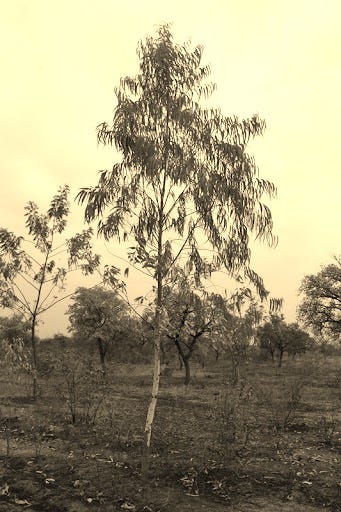Jesus Is A Mango Tree, So Are You
And why eucalyptus trees are the worst
Psalm 1 says that a blessed person is like a tree. We’re not told what kind of tree it is, except that it bears fruit. And that it has a slow existence. It bears fruit in season, which means it has barren seasons so that it might bear fruit at the right time. And it’s enduring: its leaves do not wither (v. 3)
I grew up in a part of the world where trees were rare. Burkina Faso is right on the edge of the Sahara desert, and deforestation has been a longstanding problem. As part of an effort to reverse years of environmental degradation, the national government implemented a policy of planting as many eucalyptus trees as quickly as possible. Random plots of land across the country had several hundred eucalyptus trees planted in perfect rows. So perfect, it looked wrong.
Eucalyptus trees are fast growing and can withstand the extreme temperatures, which is why they were chosen for the task. But even as a 9 year old kid, I remember feeling a sense of indifference if not disdain for the eucalyptus trees. The perfect rows seemed dystopian, and I wondered if they were really accomplishing their mission. They provided little to no shade because they were slender, however tall, with wispy leaves. Still worse, they provided nothing to forage. And foraging for hours in the hot wilderness was one my favorite activities.
To put it another way, the reason I had no love for the eucalyptus trees was because I loved mango trees. Where I grew up, mango trees were like ancient totems in the wilderness, recalling a time of abundance and wealth. Like the eucalyptus trees, they could survive the extreme climate. But they provided incredible amounts of shade. Deep, leafy branches could stretch far enough for neighborhood kids to play marbles in the dirt while the old men sat in their Adirondack-style chairs cherishing every puff of their 25-Frank cigarette (cigarettes were always individually sold). In places where there was no church building, we’d gather the newly-converted Christians under a mango tree to sing and celebrate the Supper with locally-grown bissap. The only fault of mango trees (if we want to call it one) is that they grow slowly.
Most importantly, mango trees bore fruit. Oh. My. Goodness, did they bear fruit. As my father used to say, it wasn’t a question of whether there would be famine that year in the country, it was a question of how bad the famine was going to be. But in the midst of food shortages, during mango harvesting season, there were so many mangoes, there’d be piles of them rotting on the side of the road. I remember one side street of a public market being unwalkable during mango season because the rotting fruit produced Egyptian-plague-level swarms of flies feasting on the leftovers. On my own neighborhood street, the kids and I would run the twilight dusk with sticky orange lips as we kicked a rubber soccer ball around, sugar-high and gleeful.
(To this day, it troubles me that the vast majority of neighborhood trees in America aren’t fruit-bearing. And I think it says something about us culturally).
Maybe my childhood is why I imagine the tree to which Psalm 1 compares the blessed man to be a mango tree. And fittingly so, because the Psalm says that the tree is planted by streams of water. It’s nice to know that there are trees that can bear fruit even if the stream they are planted by is in the Sahel of West Africa and so dries up from time to time.
Here’s what I’m getting at: Christians should to be like mango trees, not like eucalyptus trees. Christians should bear fruit, if nothing else, because that’s what it looks like to be blessed according to Psalm 1. Fruit need not only be edible. In a dry and parched world, shade is almost as worthy fruit to bear as fruit itself.
Let me continue: Christians should also endure despite long droughts and extreme climates. The way to survive is to have a slow existence. Mango trees don’t grow quickly, which is what makes them all that they are.
As Psalm 1:2 says, the way to do be a mango tree is “to meditate on the law of the Lord day and night.” There’s no set time frame to it. It just needs to be a daily—and nightly—activity. Meditation isn’t quick. Just as Jesus opened the scripture on a slow walk with he two disciples on the road to Emmaus, so we can dig our roots deep into the soil of God’s word to grow slowly and with fruit in mind.
Jesus was a mango tree. And he still is. It’s for good reason that Psalm 1 is specific in its language. The author says blessed is the man. That singular man is Jesus who is the Tree of Life for us all. Christians eat the fruit of his body and blood that he bore in the due season of his death and resurrection. And he accomplished all of it by meditating on the law of God day and night.
So, be like Jesus.
Be a mango tree.
Be slow, and bear fruit for a hungry and parched world.
Be blessed.
For really encouraging information about reversing decades of deforestation through indigenous practices, watch this:







Love this post!